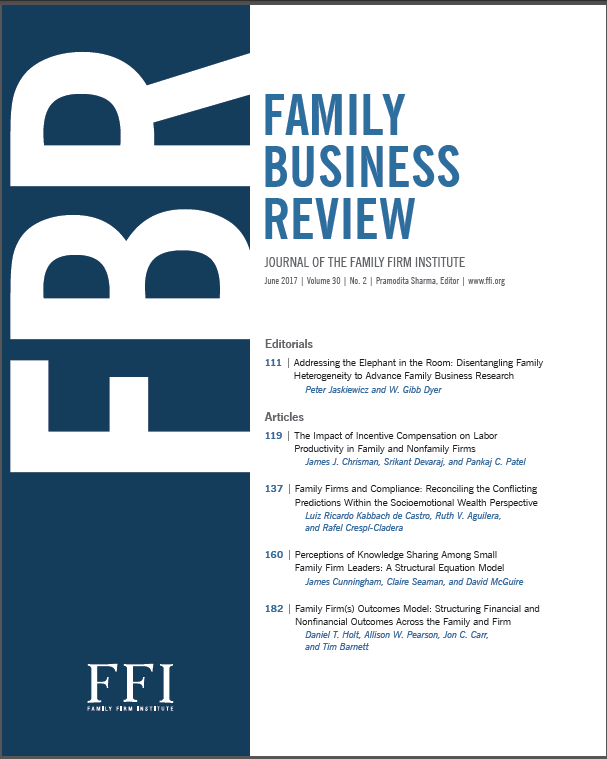WANTED—Theoretical Contributions: An Editorial on the Pitfalls and Pathways in Family Business Research
IF 5.6
1区 管理学
Q1 BUSINESS
引用次数: 16
Abstract
Every management scholar is keenly aware of the need for contemporary research to make a theoretical contribution to the literature. As editors and reviewers, we wear the hat of “gatekeepers of the quality of the journal” (Chrisman et al., 2017, p. 214) and our assessment of the theoretical contributions of the manuscripts we appraise significantly color our editorial recommendations and decisions. As authors, we recognize the magnitude of this threshold and invest (or should invest) considerable effort in developing, expressing, and highlighting the theoretical contribution(s) of our own work. Despite this effort, more than 90% of the manuscripts submitted to journals like Family Business Review (FBR) are rejected, and the majority of those ill-fated submissions suffer from unclear or underdeveloped theoretical contributions. Over our respective careers, we have read, reviewed, and written decision letters for hundreds of family businesses manuscripts. In every case, we have commented on the extent to which the manuscript makes a theoretical contribution, and we have recommended rejection, revision, or acceptance based, significantly, on our assessment of the accomplishment of this threshold. Even for those papers we have evaluated positively, we have often pushed authors to clarify, deepen, or extend their contributions to theory and/or to the literature in general. Clearly, the need to contribute theoretically is imperative, and each paper’s ultimate ability to make a theoretical contribution varies. While the potential contribution of each manuscript varies, we have noticed persistent patterns in the types of family business papers we have reviewed. In our reviews and decision letters, we often find ourselves expressing a common set of criticisms and concerns that plague many of the papers we evaluate. In essence, we find that many authors, and consequently many family business papers, are repeatedly falling into the same few “theoretical pitfalls.” Based on our collective experience, we have identified four categories that capture many of these potential pitfalls. While research from each of these (and other) categories may indeed present a strong theoretical contribution, we observe that the relative ability (and manner) of each category to contribute to the literature can vary significantly. Furthermore, we find that the types of theoretical pitfalls associated with each category are generally consistent. This is troubling as many submissions are being rejected (oftentimes without even being sent out for full review) for largely the same few overarching reasons. In this editorial, we provide some guidance to authors by explaining what it means to make a theoretical contribution. We then identify and discuss four categories of family business papers, each of which presents different avenues or likelihood of making a theoretical contribution. For each type, we highlight common shortcomings found in manuscripts and offer authors ideas to further sharpen their theoretical work. Following that, we provide a practical guide to help family business scholars understand, clarify, and deepen the contributions of their work. Specifically, we encourage researchers to decide to what conversation their paper intends to contribute and discuss various pathways authors can take to maximize their contribution to the family business literature.理论贡献:家族企业研究的陷阱与路径评论
每一位管理学者都敏锐地意识到,当代研究需要对文献做出理论贡献。作为编辑和审稿人,我们戴着“期刊质量守门人”的帽子(克里斯曼等人,2017年,第214页),我们对所评估手稿的理论贡献的评估显着影响了我们的编辑建议和决策。作为作者,我们认识到这个门槛的重要性,并投入(或应该投入)相当大的努力来发展、表达和突出我们自己工作的理论贡献。尽管如此,提交给《家族企业评论》(Family Business Review, FBR)等期刊的90%以上的手稿都被拒绝了,而且这些不幸的投稿大多是因为理论贡献不明确或不发达。在我们各自的职业生涯中,我们已经阅读、审阅和撰写了数百份家族企业手稿的决定函。在每种情况下,我们都对稿件的理论贡献程度进行了评论,并根据我们对该阈值的完成情况的评估,建议拒绝、修改或接受。即使是那些我们给予积极评价的论文,我们也经常要求作者澄清、深化或扩展他们对理论和/或一般文献的贡献。显然,理论上的贡献是必要的,而每篇论文做出理论贡献的最终能力各不相同。虽然每个手稿的潜在贡献各不相同,但我们注意到,在我们所审查的家族企业论文类型中,存在持续的模式。在我们的评论和决定信中,我们经常发现自己表达了一组共同的批评和关注,这些批评和关注困扰着我们评估的许多论文。从本质上讲,我们发现许多作者,以及许多家族企业论文,都在反复陷入同样的几个“理论陷阱”。根据我们的集体经验,我们已经确定了捕捉这些潜在陷阱的四个类别。虽然这些(和其他)类别的研究可能确实有很强的理论贡献,但我们观察到,每个类别对文献的贡献的相对能力(和方式)可能会有很大差异。此外,我们发现与每个类别相关的理论陷阱类型通常是一致的。这是一个令人困扰的问题,因为许多提交内容都因为相同的几个主要原因而被拒绝(通常甚至没有被发送出去进行全面审查)。在这篇社论中,我们通过解释什么是做出理论贡献来为作者提供一些指导。然后,我们确定并讨论了四类家族企业论文,每一类都提出了不同的途径或做出理论贡献的可能性。对于每种类型,我们都强调了手稿中发现的常见缺点,并为作者提供了进一步提高理论工作的想法。在此基础上,本文提供了一个实用的指导,以帮助家族企业学者理解、澄清和深化他们的工作贡献。具体来说,我们鼓励研究人员决定他们的论文打算贡献什么对话,并讨论作者可以采取的各种途径,以最大限度地提高他们对家族企业文献的贡献。
本文章由计算机程序翻译,如有差异,请以英文原文为准。
求助全文
约1分钟内获得全文
求助全文
来源期刊

Family Business Review
BUSINESS-
CiteScore
12.40
自引率
13.60%
发文量
13
期刊介绍:
Family Business Review (FBR) has been a refereed journal since 1988, serving as the premier scholarly publication dedicated to the study of family-controlled enterprises. It delves into the dynamics of these businesses, encompassing a range of sizes from small to very large. FBR concentrates not only on the entrepreneurial founding generation but also on family enterprises in subsequent generations, including some of the world's oldest companies. The journal also publishes interdisciplinary research covering families of wealth, family foundations, and offices.
 求助内容:
求助内容: 应助结果提醒方式:
应助结果提醒方式:


